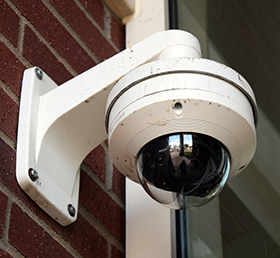Security cameras, an aging tennis player, and examining our lenses of conscience

The prevalence of security cameras is sparking a debate in society about when they might infringe on privacy. Followers of Jesus would do well do regularly clean and fine tune the lenses of their conscience, and examine its footage at the end of each day.
I enjoy tennis. In my boyhood long ago, I would practice for hours by hitting a ball against the sturdy outside walls of one of two buildings — the local high school gym or a furniture store just a block from our house. No one inside ever told me to stop, and so in my imagination I had thrilling matches playing the roles of both Jimmy Connors and Bjorn Borg.
The other evening I went to the tennis courts of a nearby high school to practice my serves. All courts were occupied, but a nearby brick wall with an adjoining flat parking lot beckoned me to practice there. Maybe I could rekindle my boyhood imagination, I thought, and create a match between Rafael Nadal and Roger Federer. Now that I’m 61, that would take a lot of imagination.
And then I saw it. At the top corner of the school’s large brick wall was a small glass dome. Inside, I’m sure, was a video camera.
So I turned away. The camera made me realize it’s probably not a good idea to bang a ball against the wall of a building that I don’t own. Was it a prick of conscience, or fear of being fined for trespassing and (an admittedly weak) attack on property?
Security cameras are everywhere in our society — on traffic lights, inside businesses, on the bodies of police officers, and now even as part of doorbells. Following the defacing of an outdoor statue of Jesus in Peoria in early July, there has been talk of placing security cameras near or even within a replacement statue to help prevent a repeat act of violence.
While it would be easy to think security cameras are just to deter the criminal element — and the actions of aging tennis players — ask yourself this question: Do you instinctively tap the brake when you see a police car on an overpass, the side of the road, or on an overpass? I do, even if I’m not speeding.
Let’s take it further. If your spouse or children had cameras scanning your living room, would you be watching that television show or movie when at home alone, or visiting that website?
For a Christian, the lens of conscience is always pointed at us. Remember Jesus’ warning to hypocrites in Luke’s Gospel? “There is nothing concealed that will not be revealed, nor secret that will not be known. Therefore, whatever you have said in the darkness will be heard in the light, and what you have whispered behind closed doors will be proclaimed on the housetops.”
The Catechism of the Catholic Church tells us: “Deep within his conscience man discovers a law which he has not laid upon himself but which he must obey. Its voice, ever calling him to love and to do what is good and to avoid evil, sounds in his heart at the right moment. . . . For man has in his heart a law inscribed by God. . . . His conscience is man’s most secret core and his sanctuary. There he is alone with God whose voice echoes in his depths.”
The prevalence of security cameras is sparking a debate in society about when they might infringe on privacy. Followers of Jesus would do well do regularly clean and fine tune the lenses of our conscience, and examine its footage at the end of each day. — Thomas J. Dermody





